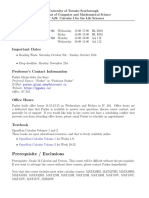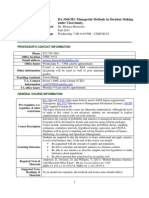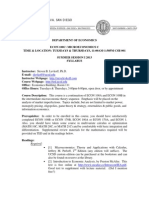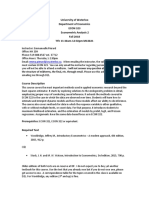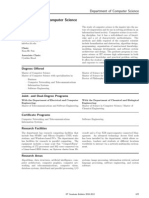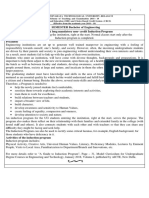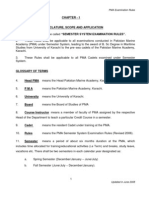CH 301 Principles of Chemistry I (Uniques 51755, 51765) Spring 2014 Syllabus
CH 301 Principles of Chemistry I (Uniques 51755, 51765) Spring 2014 Syllabus
Uploaded by
Matt ShawCopyright:
Available Formats
CH 301 Principles of Chemistry I (Uniques 51755, 51765) Spring 2014 Syllabus
CH 301 Principles of Chemistry I (Uniques 51755, 51765) Spring 2014 Syllabus
Uploaded by
Matt ShawOriginal Title
Copyright
Available Formats
Share this document
Did you find this document useful?
Is this content inappropriate?
Copyright:
Available Formats
CH 301 Principles of Chemistry I (Uniques 51755, 51765) Spring 2014 Syllabus
CH 301 Principles of Chemistry I (Uniques 51755, 51765) Spring 2014 Syllabus
Uploaded by
Matt ShawCopyright:
Available Formats
CH301 Principles of Chemistry I Syllabus (1/8/14) Page 1 Spring 2014
CH 301 Principles of Chemistry I (Uniques 51755, 51765)
Spring 2014 Syllabus Last revised 1/8/14
This course is the first half of a two-semester freshman chemistry sequence, and is primarily designed for
freshman college students aiming for a degree in a science-related field, or those non-scientists who have some
chemistry knowledge and want to know more! We build on chemistry background that you should have acquired
during high school/ AP chemistry, or previous chemistry for non-science major courses. In addition to attending
class and reading the textbook, you will be working on your problem-solving skills with weekly homework and in-
class questions. New knowledge and understanding is useful, but thoughtful reflection and application of that
knowledge form a solid foundation on which to build higher level chemistry courses, not to mention help you
understand more about the world around us. Course content will cover an introduction to quantum mechanics
and atomic theory, periodic trends, bonding, intermolecular forces, the states of matter, and thermodynamics.
General Course Information
Course personnel
Ruth Shear (Course Instructor) ......................................................... DrRuth@austin.utexas.edu, 471-5755, WEL 5.239C
Josh Lara (TA) ............................................................................................................................ joshjeromelara@gmail.com
Owen Williams (TA) ............................................................................................................... owenm.williams@utexas.edu
Stephany Garcia (TA) ........................................................................................................... stephanygarcia87@utexas.edu
Email is the best way to get hold of us outside our office hours. DrRuth rarely answers her phone and responds to
voicemail much slower than email. Please see the notes below about email etiquette, and how to choose between
sending questions by email or to Piazza.
Class meeting times and places
Lectures: TTh 9:30 11 am (51755), 12:30 2 pm (51765) ........................................................................... WEL 1.308
Your attendance at class, and participation in class discussion is expected. In-class quizzes will be given, and
points will be allocated for your presence and participation, as well as your answers. Please contact DrRuth by
email if you are unable to attend class. While this is not something you may not normally think of doing, this is a
common courtesy that she would appreciate, and that may help you if some non-academic situation arises.
Asking did I miss anything important? devalues the work she does for the class, so dont! It is your
responsibility to find out what you missed, by getting a copy of the notes from another student in the class. Once
you have reviewed the material you missed, feel free to come to office hours if you have any questions.
Office hours
TA office hours: will be listed on our Canvas page.
DrRuths office hours will be determined after a class survey has been performed to find the most useful times for
the majority of students in the class and will be announced in class and on Canvas. In addition to official office
hours, you may arrange a meeting with any of us via email. You are welcome to drop by DrRuths office and try to
catch her there; however do not disturb your TAs outside office hours, except by appointment. You are
encouraged to meet with DrRuth in person. Do not be afraid to contact her about academic or non-academic
problems with this course. You do not want to get a bad grade in this class when there is something that could
have been done if you had talked to her in time.
Prerequisites
To enroll in this class you must have credit with a grade of at least C
or be registered for one of these math
courses (M 305G, 408C, M 408D, M 408K, M 408L, M 408M, 408N, 408S, or SSC 302), and a score of 85% on the
ALEKS preparatory chemistry assessment see below for more details). If you do not meet these requirements,
you will be dropped from the class. E-mail DrRuth if you think there might be complications that need to be
cleared up.
CH301 Principles of Chemistry I Syllabus (1/8/14) Page 2 Spring 2014
ALEKS prep assessment http://www.cns.utexas.edu/chemistry-assessment-placement
ALEKS is a web-based assessment and tutoring software that is used to help you perform well in this class. It
determines your level of knowledge in the topics we nominate, and then teaches you the topics in which you are
not yet competent. The material covered by this preparatory assessment is prior assumed knowledge that will not
be taught in CH301. All CH301 students are required to complete the ALEKS Preparatory Chemistry Assessment.
You should have been notified of this via email once you had registered for this class. You must achieve a score of
85% either by scoring well enough on the initial assessment, or by using the learning modules to improve your
assessment score or you will not be permitted to stay in the class. Note that if you are repeating this course, you
are required to retake this assessment (using the link above NOT the link direct to the ALEKS website).
Undergraduate chemistry course office
Questions about registration such as adds/drops, changing sections, prerequisites, etc. all should be directed to
the Undergraduate Chemistry Course Office (WEL 2.212). They also have a lost and found service.
Drop dates
The last date of the official add/drop and late registration period is Thursday, January 16
th
. The twelfth class
day, on which official enrolment count is taken, and last day to drop and get a possible course refund is
Wednesday, January 29
th
. The last day to drop the course for academic reasons is Monday, March 31
st
, which
requires both instructor and Dean approval. A Q-drop will only be allowed at this point if you are passing the
course with a grade of C or better, or have a substantiated non-academic reason for dropping, as required by UT
regulations. After this date you would only be granted a drop for urgent substantiated non-academic reasons.
Quantitative Reasoning
This course carries the Quantitative Reasoning (QR) flag. QR courses are designed to equip you with skills that
are necessary for understanding the types of quantitative arguments you will regularly encounter in your adult
and professional life. You should therefore expect a substantial portion of your grade to come from your use of
quantitative skills to analyze real-world problems.
Accommodations
Students who may need special accommodations (such as athletes and students with disabilities) must notify
DrRuth by the twelfth class day by presenting a letter from the team coach, or from the Services for Students with
Disabilities (SSD) office. It is University policy that a student may make-up exams missed due to observance of a
religious holiday. Please notify us by the twelfth class day if this applies to you.
Academic integrity
For this class, all work done on exams must be solely your own work. All answers submitted for any assessment
item need to be determined and submitted by you. At times you will be encouraged to talk to others around you
in class during an in-class participation question to help you determine what you believe to be the best answer.
You are encouraged to work with others on your Quest worksheets, because it is known that students learn the
work more thoroughly if they engage in explaining it to others; however, you should realize that if you
consistently get help answering worksheet questions, and never attempt to solve them on your own, you wont
be able to answer exam questions when the time comes. ALEKS teaches at the knowledge level it sees, so if you
get help with your ALEKS work, then ALEKS will attempt to teach you at an inappropriate level. Scholastic
dishonesty will not be tolerated in this course. It is your responsibility to educate yourself on what is considered
unacceptable. If you are caught you will be presented with our evidence and given a chance to explain yourself.
Where appropriate, DrRuth will determine your penalty, and you will be reported to Student Judicial Services
(SJS). For definitions of inappropriate behaviour, such as plagiarism, and the UT policy regarding such activities,
see the SJS website: <http://deanofstudents.utexas.edu/sjs/acadint_whatis.php>
CH301 Principles of Chemistry I Syllabus (1/8/14) Page 3 Spring 2014
Course Materials
Textbook
Our department has decided not to have a required textbook for freshman chemistry; however, we recommend
you have either a textbook, or online readings that you refer to regularly as part of your study for this class. Our
suggested textbooks are both called Chemical Principles, written by either Steven S. Zumdahl or Peter Atkins and
Loretta Jones. Extra credit is available for textbook reading and feedback; and section names will be supplied for
these two textbooks, but you can use any other textbook/online reading, and be responsible for working out the
equivalent material to read. Handouts, including copies of my lectures, will be provided on Canvas after each
lecture.
Non-programmable calculator
You will need a non-programmable scientific calculator for class, homework and exams, and you will need to
know how to use it. You may not use any of the following as a calculator in exams: programmable calculator, PDA,
cell phone, iPhone, etc. A non-programmable calculator is one that cannot store information or formulas. You will
want a calculator that can handle basic arithmetic functions, logarithms, exponents, and parentheses. If you are
unsure if your calculator is programmable, ask us before the day of the exam. Do not expect us to provide a
calculator for you.
iClicker <http://www.iclicker.com/>
You are expected to purchase an iClicker remote for in-class participation, which will let you respond to
questions posed during class. There is more than one type of classroom response remote used at UT and
available at the Coop, make sure you buy the correct brand. I will be using only multiple-choice questions, and so
you may use an iClicker, an iClicker 2, an iClicker+, or iClickerGO on your mobile device (though I cant
guarantee the rooms wifi can cope with an entire class using this option at once. To receive course credit for
your iClicker responses, register your remote on the iclicker website by the end of the next class after twelfth
class day. You must have attended class and voted on at least one question before that time in order to complete
your registration properly. There is no registration fee. You are expected to bring your iClicker to every class, as
you will not get credit if you do not have it with you. Watch your battery level as running out of power is not an
acceptable excuse. Any student found operating more than one iClicker during a class will be reported to Student
Judicial Services and may receive a fail for the course.
ALEKS <http://www.aleks.com>
Course code for 51755 9XMHJ-FRCXW Course code for 51765 Y6GFT-R9RJN
For this course, you are required to pay $40 and subscribe for one semester to the ALEKS website, which will be
used to provide much of our homework. To put this into perspective, this is how much you would pay for one or
two tutoring sessions with a private tutor, and ALEKS is your own personalized tutor for the entire semester. You
can of course choose to switch to a different CH301 section if you would prefer not to use ALEKS. ALEKS
homework must be performed online, so you need regular access to a computer on the internet.
Quest <http://quest.cns.utexas.edu/>
This course makes use of the web-based Quest content delivery and homework server system maintained by the
College of Natural Sciences. This homework service will require a $25 charge per student per class for its use,
with no student being charged more than $50 a semester. This goes toward the maintenance and operation of
the resource. After the 12th day of class, when you log into Quest you will be asked to pay via credit card on a
secure payment site. You have the option to wait up to 30 days to pay while still continuing to use Quest for your
assignments. For payment questions, email quest.billing@cns.utexas.edu.
CH301 Principles of Chemistry I Syllabus (1/8/14) Page 4 Spring 2014
Course Content
You are expected to already know and be able to apply fundamental principals of Chemistry that you would have
learned from High School, or other introductory chemistry courses, such as CH304. The assumed material and
topics are covered in Chapters 14 of Zumdahl, or the Fundamentals section at the front of Atkins and Jones. The
ALEKS Preparatory Chemistry Assessment is designed to test you on that material and bring you up to speed on
those parts of the material that you do not recall or never learned. Relevant sections of this prerequisite material
will be assumed and may be directly included in lectures, homeworks, quizzes, and exams.
The topics that will be covered in this class, divided into sections associated with each class exam, and listing
relevant chapters in the two recommended texts are as follows:
Exam Topic Zumdahl (6
th
ed.) Atkins and Jones (4
th
ed.)
1 Quantum mechanics and
the atom
12: Quantum mechanics and atomic
theory
1: Atoms: The quantum world
2 Bonding 13: Bonding: General concepts
14: Covalent bonding: Orbitals
2: Chemical bonds
3: Molecular shape & structure
3 Gases, liquids, and solids 5: Gases
16: Liquids and solids
4: The properties of gases
5: Liquids and solids
4 Thermodynamics 9: Energy, enthalpy and
thermodynamics
10: Spontaneity, entropy, and free energy
6: Thermodynamics: The first law
7: Thermodynamics: The second
and third laws
Final All of the above All above All above
Assessment Items and Grading
Your overall score for this course will be a combination of your points from ALEKS homework, Quest homework,
in-class iClicker participation, class exams, and a final exam, with relative weightings described below. There are a
small number of extra credit opportunities; in particular, extra credit is available to those who wish to participate
in the textbook reading feedback option described below.
Homework <http://www.aleks.com/> and <http://quest.cns.utexas.edu/student/>
Working homework problems is essential to understand the material of this course. Your performance on your
exams can be predicted from how well you understand and solve the homework problems. Homework will be
assigned regularly, and will count as 10% of your total grade, after dropping your two worst homework scores.
We use both ALEKS and Quest, details above, to assign homework. The majority of the course topics will be
covered in your weekly ALEKS homework, due each Monday at the start of class. Quest is used to cover the topics
not included in ALEKS and to give you extra practice for some topics that benefit from repetition. Additionally,
the Quest system is used to create all exams for this course and so it is important to get used to the type of
questions you would receive from this system. Quest homework is shorter, and is assigned every Thursday. You
would be wise to work on both homeworks throughout the week as we cover the topics in class, rather than put
them off until the weekend. Your combined homework score will be 5% from ALEKS and 5% from Quest, after
dropping your worst homework score from each set (i.e., one ALEKs and one Quest score). There is no way to
makeup missed Quest homework grades. See below for a way to make up missed ALEKS homework.
ALEKS homework: After the ALEKS prep chemistry assessment due date is passed, each Tuesday at the start of
class, an ALEKS objective will be due. On the due date, to get full credit for that homework, you must have
completed 85% of the topics assigned for that objective. If you make less than 85%, then the percentage of topics
you have correct will be your credit for that objective (i.e., if you get 85% you get full credit, if you get 84% you
CH301 Principles of Chemistry I Syllabus (1/8/14) Page 5 Spring 2014
will get 84% of the credit. You should make sure you get at least 85% each week.). If you fall behind in an ALEKS
objective, any topics that are prerequisites for future homework will still be taught to you. If you finish an
objective before its due date, you then not only have access to the next objective, but also to topics from previous
objectives that arent used again as prerequisites, so you can continue to work on them. At the end of the
semester, all topics will reopen for final study time after the end of classes, and you have another opportunity to
improve your ALEKS score. Be warned that your final ALEKS score can go down if you skip or get questions
wrong that you got correct earlier in the semester. To determine your ALEKS homework grade, we will count the
higher of two things, either the average of your ALEKS objective scores after dropping the worst one, or your final
percentage of topics learned over the entire semester (meaning you can make up for bad ALEKS scores by
continuing to work on the topics you didnt finish previously). ALEKS homework must be completed online.
Quest homework: After downloading your Quest homework from the server, you can work on it offline, and then
submit your answers online before the due date and time. Each problem has multiple variations, so your
homework will not be the same anyone else in the class. For this reason, it is important that you keep your copy
of your Quest problems in case you have questions about grading later. The answer key, with selected problems
written out, will be available once each deadline is past. Do not wait until the last minute to submit your
homework because if you dont get it in, no matter what the excuse, we will not accept late homework, given that
the answers will be available. When grading your homework, Quest will allow multiple guesses for most
problems, however negative grading is used. If you get the correct answer on the first try you get full credit. If you
give one wrong response, followed by the correct answer, you will get partial credit. However, you continue to
lose points each time you continue to guess the answer incorrectly, and can end up with negative credit. The
moral of this story is do not guess the answer.
In-class participation and questions
Participation in class activities has been shown to increase student retention and understanding of the material, in
addition to helping us see what misunderstandings are out there. Periodic interaction also helps break up the
long periods of class, helping to re-concentrate wandering minds. Class-related discussions may include
information and topics not covered in the textbook. Informal in-class questions will be given during lectures. To
answer these questions you must attend class, and bring and use your iClicker. You will get points for
participating in the in-class questions, regardless of whether you get them right or wrong. Occasionally you will
be informed that a particular question will be worth more points if you get the correct answer. All iClicker points
will count as 5% of your overall course grade, starting on the twelfth class day. There is no way to makeup points
for in-class questions.
Textbook reading and feedback extra credit option
At the end of each class youll be told which topics we plan to cover in the next lecture, with the corresponding
sections of Zumdahl and Atkins and Jones. There will be a section set up in Canvas allowing you to send me
feedback by 8 pm the day before the next lecture, letting me know which parts of the reading were
easy/clear/already known to you, and which parts of the reading were difficult/problematic/ confusing. You can
earn up to 2% extra credit by regularly participating in this feedback system.
Practice exams and exam reviews
A practice exam will be assigned on Quest a week before each in-class exam. These practice exams will not count
towards your final grade. The lecture before each class exam will be a review of the material to be included in that
exam, and your TA will also hold an exam review session during the week before each class exam. Multiple review
sessions, but no practice exam, will be offered before your final exam.
Exams
Four class exams and one final exam will be given during the semester, at times indicated in the Course Schedule,
and in the following table. No student will be allowed to leave the exam in the first 45 minutes, and no student
arriving 45 minutes or later after an exam has started will be permitted to take the exam. You must bring these
CH301 Principles of Chemistry I Syllabus (1/8/14) Page 6 Spring 2014
things to each exam: your valid University ID, several #2 pencils, and your own non-programmable calculator.
Each exam will be multiple-choice questions that are machine graded. Each student will receive a unique exam
with its own version number. No two students will have the same version number. It is therefore very important
that you keep your copy of each of your exams. You need this copy in order for us to verify you as the student
who took that version of the exam; necessary if we have a case of two or more students submitting identical
version numbers on their exams. Each student must verify their copy in order to receive a grade, otherwise their
score will be changed to a zero for that exam and they will be reported to the dean for scholastic dishonesty.
Exam Topic Date Time
Exam 1 Quantum mechanics and the atom Wed, Feb 5
th
7 9 pm
Exam 2 Bonding Wed, Mar 5
th
7 9 pm
Exam 3 Gases, liquids, and solids Wed, Apr 2
nd
7 9 pm
Exam 4 Thermodynamics Wed, Apr 30
th
7 9 pm
Final Exam Comprehensive (all topics)
51755
51765
Fri, May 9
th
Thu, May 8
th
9 am noon
2 5 pm
Final Exam
The final exam for CH301 is comprehensive, meaning covering all material from the entire semester. If you keep
up with the course, and do your homework weekly, the final will not be any more difficult than the previous four
exams. It will be extremely difficult if you try to cram for it a day or two ahead. It will be held at the date and time
listed above. You should not schedule flights, make travel arrangements, or any other plans that will interfere
with your attendance at this scheduled time. You may choose not to take the final, as described below.
Grading Options
Option One the standard grading scheme: Most of you will follow the option one grading scheme shown in the
table, where you get to drop the worst of your four in-class exams.
Option Two for those who do well all semester and/or are happy with their current grade: At the end of the
semester, if you combine your homework, in-class participation and quizzes, and all four class exams, using the
option two grading scheme below, you can take the grade you have earned. This means that if you do not take
the final, option two will be automatically used for your final grade. To be eligible for this option, you must have
submitted at least 75% of the homework assignments, and have taken all four of the in-class exams.
Option Three for those who suddenly get it by the end of the semester: If you use the option two grading scheme
to combine your homework, in-class participation, and all four class exams, and if your score on your final exam
is higher than your option two final score, then your final exam score will be substituted for your entire
semesters grade. To be eligible for this option you must have submitted at least 75% of the homework
assignments and taken at least three of the four in-class exams.
Option One Option Two Option Three
ALEKS homework 5% 5%
Quest homework 5% 5%
In-class participation 5% 5%
In-class exams: best three of four 60%
In-class exams: counting all four 85%
Final cumulative exam 25% 100%
TOTAL 100% 100% 100%
CH301 Principles of Chemistry I Syllabus (1/8/14) Page 7 Spring 2014
Final grades
Final grades will be awarded using the cut-offs listed below. We reserve the right to lower one or more of these
cut-offs slightly, but they will not be raised. We do not round up and we do not curve grades. If you truly believe
that your exam performance does not accurately represent your knowledge and ability, then come and talk to
DrRuth early enough in the semester so she can help you.
B
+
! 88% C
+
! 78% D
+
! 68%
A ! 92% B ! 82% C ! 72% D ! 62% F < 60%
A
! 90% B
! 80% C
! 70% D
! 60%
Makeups
Because the exam dates are published in the course schedule, you should not have registered for another class
with conflicting schedules. We will reluctantly supply a makeup for the in-class exams if you inform us
before the 12
th
class day that you have another class which conflicts with our exams. The other reasons
acceptable for a makeup exam are as follows: (a) you are involved in an officially sanctioned University activity
(e.g., athletic or academic event) in which case a signed request from your UT sponsor must be supplied no later
than one week prior to the scheduled exam date; or (b) there is a conflict with a religious observance, in which
case you must request consideration for such an event in writing by the twelfth class day of the semester. An
exam missed for any other reason (illness, family emergencies, etc.) will be your dropped exam. The makeup for
each of the four class exams will be held from 4 6 pm the same day as the class exam. There is no makeup
opportunity for any other class assessment item. If you have experienced a chronic, documented non-academic
illness or other emergency that results in you missing multiple assessment items, you should contact DrRuth as
soon as possible to determine a suitable course of action. A student with a compelling reason, with the proper
documentation, for missing the final examination will be given an incomplete for the semester, and will be
required to take a final exam at a later date before a grade can be submitted for the course.
Regrades
There is a two-week limit on regrades for homework and class exams. This means it is your responsibility to keep
up with what grades you are receiving on a regular basis. It is very important that you keep your copy of all
homework and all exams because everyones is different! Regrades will not be considered for careless bubbling
on your scantron form. Be careful to bubble the correct answer for each question. Forgetting to do so is
unfortunate but unfixable.
Communication
Internet access
You will need e-mail and Internet access for this course. Homework and course materials such as lecture notes,
syllabus, etc. will be available only via the Internet. We use Piazza, Canvas, and Email to communicate in this
course outside of scheduled class times. You are responsible for checking your email daily for class work and
announcements. We use Canvas to post handouts, etc. All class-wide announcements are posted on the Canvas
announcement page. Make sure you have your Canvas notification settings so that you are sent alerts for all
announcements. Class email is sent to the official email address you have on file with the University. Please make
sure this address is current. Free e-mail accounts are available for all students through the university. Computer
and Internet access is available in campus computer labs. One of these computer laboratories is in the Welch
2.2xx hallway. If you are unsure how to obtain an e-mail account or Internet access, you can call the
microcomputer facility help desk at 475-9400. If you have problems accessing any of our course-related material
on the web, please let us know.
CH301 Principles of Chemistry I Syllabus (1/8/14) Page 8 Spring 2014
Piazza <http://piazza.com/utexas/spring2014/ch301/home/>
This course makes use of the web-based Piazza for class discussion. This system is set up to get you help quickly
and efficiently from classmates, the TA, and DrRuth. Any question whose answer might benefit other students in
the class should be asked here, not via email to your TA or instructor. For help or feedback about the website
email team@piazza.com.
Email Etiquette
When emailing your TA or course instructor, make sure you send us enough information so we can answer
your question and reply to you (e.g., instead of just saying you are having trouble with question 3 of the
homework, you can tell us how far you got on the question and exactly where you are stuck). Please start your
subject line with CH301:, followed by an informative phrase letting us know the basic content of your email. Use
an appropriate salutation so we know who you are talking to. Use complete sentences, correct spelling and
punctuation, and capitalize appropriately. Finish your email giving your first and last name, your UTEID, and
which unique number class section you are in.
Where to ask which questions
Questions about course content, how to do specific homework problems, etc., should not be sent by email. You
are welcome to ask them on Piazza, and get responses from your classmates. Although we can and may answer
such questions online, this is time consuming and doesnt let us watch you work through the problem and see
where you are having difficulty. We really encourage you to come to office hours to get your answer.
For general questions over course policies or materials, or about how to use Quest, please do NOT email us.
Instead, please post your question using the relevant folder tag on Piazza. This way other students can benefit
from the answer to your question and we wont spend our time answering the same questions multiple times,
leaving us more available for office hours and other one-on-one help. Plus, you can scan through the questions
and benefit from other students questions and answers.
Questions about ALEKS can be made by phone (714) 619-7090, or through this site: <http://support.aleks.com>
For more personal questions or questions you are not comfortable posting on Piazza, please email DrRuth
directly.
Final Thoughts
Even if there were no in-class assessment, and though the lecture notes will be available online, I strongly
encourage you to attend classes. I will speak about material that is in addition to what is in the lecture notes and
textbook. Most of this is extra information to help you see the relevance and meaning behind the topics we are
studying. It will not be on the exam but may motivate you to be more interested in the material. I do not believe
in simply teaching you answers, or the rote steps to use to answer questions. I want you to understand the
reasons behind the steps we use. I want you to be able to think about questions we havent taught you how to
answer. Like all of the sciences, chemistry is learned only by doing. You cant work too many problems, either
alone or in study groups, which I encourage. Doing your homework, reviewing worked examples in the text and
attempting problems in your textbook at the end of each chapter are essential study habits. I strongly encourage
you to attend office hours (both mine and the TAs) well prepared with questions. These are run like discussion
sessions, where we not only answer your questions and increase your understanding (we hope!), but also help
you learn to learn, and learn to help each other learn.
DrRuth
You might also like
- New York City SHSAT Prep 2022 & 2023: 3 Practice Tests + Proven Strategies + ReviewFrom EverandNew York City SHSAT Prep 2022 & 2023: 3 Practice Tests + Proven Strategies + ReviewNo ratings yet
- Chem 1412Document5 pagesChem 1412Jesús A. Garro UmañaNo ratings yet
- Econ 123A - Syllabus - Fall 2017Document4 pagesEcon 123A - Syllabus - Fall 2017chenNo ratings yet
- CH153K Syllabus Spring 2021Document4 pagesCH153K Syllabus Spring 2021flyNo ratings yet
- Spring 10Document4 pagesSpring 10Theodore LiwonganNo ratings yet
- SyllabusDocument8 pagesSyllabusRampal Chole KulcheNo ratings yet
- Edition, Wirtz, Chew, and Lovelock, PearsonDocument3 pagesEdition, Wirtz, Chew, and Lovelock, PearsonmanagementclassNo ratings yet
- SyllabusDocument5 pagesSyllabuserasfm2024erasNo ratings yet
- Science A Levels Without CourseworkDocument8 pagesScience A Levels Without Courseworkfupbxmjbf100% (2)
- CLAS 230-All J Sections - Fall 2021 - SyllabusDocument14 pagesCLAS 230-All J Sections - Fall 2021 - SyllabusMorgan GalushaNo ratings yet
- Course Information Course Description: Mlevins@purdue - EduDocument4 pagesCourse Information Course Description: Mlevins@purdue - Edubozzaitabob4493No ratings yet
- OM 335 (04180) Operations Management Spring 2013: MW 8:00 AM - 9:30 AM in GSB 5.142ADocument6 pagesOM 335 (04180) Operations Management Spring 2013: MW 8:00 AM - 9:30 AM in GSB 5.142Akpankaj88No ratings yet
- ACC 312 - Fundamentals of Managerial Accounting - AtiaseFDocument6 pagesACC 312 - Fundamentals of Managerial Accounting - AtiaseFGul AsfNo ratings yet
- PHYS 2053 - General Physics I Syllabus f2014Document6 pagesPHYS 2053 - General Physics I Syllabus f2014nullNo ratings yet
- Physics 2610 Syllabus Fall 2023Document6 pagesPhysics 2610 Syllabus Fall 202320harriskeNo ratings yet
- EE 341, EE 394-13, Spring 2015, Electric Machines and DrivesDocument2 pagesEE 341, EE 394-13, Spring 2015, Electric Machines and DrivesSusana RebellónNo ratings yet
- UT Dallas Syllabus For Ba3360.5e1.11f Taught by Monica Brussolo (Meb049000)Document6 pagesUT Dallas Syllabus For Ba3360.5e1.11f Taught by Monica Brussolo (Meb049000)UT Dallas Provost's Technology GroupNo ratings yet
- 1602 SyllabusDocument6 pages1602 SyllabusLena NikiforovNo ratings yet
- WST312 Study Guide 2024Document13 pagesWST312 Study Guide 2024tototapzNo ratings yet
- Syllabus From A Human Computer Interaction Class at UGADocument6 pagesSyllabus From A Human Computer Interaction Class at UGAPaul PraeNo ratings yet
- Original Syllabus of MATH241Document5 pagesOriginal Syllabus of MATH241salumonaNo ratings yet
- Screenshot 2023-12-28 at 2.01.20 AMDocument6 pagesScreenshot 2023-12-28 at 2.01.20 AMrozana karimNo ratings yet
- Syllabus - Fall 2015 295 MondayDocument7 pagesSyllabus - Fall 2015 295 MondayzzmasterNo ratings yet
- UT Dallas Syllabus For Aim2302.001.09s Taught by Zhonglan Dai (zxd051000)Document6 pagesUT Dallas Syllabus For Aim2302.001.09s Taught by Zhonglan Dai (zxd051000)UT Dallas Provost's Technology GroupNo ratings yet
- Jmu Phys 260Document4 pagesJmu Phys 260Brian SeymourNo ratings yet
- N3612 Spring 2015 SyllabusDocument13 pagesN3612 Spring 2015 SyllabusTrish HồNo ratings yet
- Econ 100c Syllabus Ssi13Document7 pagesEcon 100c Syllabus Ssi13other1991No ratings yet
- Econ 21020/1: Econometrics University of Chicago, Fall 2018: Final Exam: TBDDocument5 pagesEcon 21020/1: Econometrics University of Chicago, Fall 2018: Final Exam: TBDAhmad MustafaNo ratings yet
- UT Dallas Syllabus For Aim2302.003.08s Taught by Zhonglan Dai (zxd051000)Document6 pagesUT Dallas Syllabus For Aim2302.003.08s Taught by Zhonglan Dai (zxd051000)UT Dallas Provost's Technology GroupNo ratings yet
- UT Dallas Syllabus For Chem2323.002.09f Taught by Jung-Mo Ahn (Jxa041100)Document6 pagesUT Dallas Syllabus For Chem2323.002.09f Taught by Jung-Mo Ahn (Jxa041100)UT Dallas Provost's Technology GroupNo ratings yet
- Chemistry 103-6 Fall 2015: Lecturer: Dr. Stephen BlockDocument8 pagesChemistry 103-6 Fall 2015: Lecturer: Dr. Stephen BlockAnonymous y63hSuHQzpNo ratings yet
- University of Waterloo Department of Economics Econ 323 Econometric Analysis 2 Fall 2018 TTH 11:30Am-12:50Pm Mc4021Document5 pagesUniversity of Waterloo Department of Economics Econ 323 Econometric Analysis 2 Fall 2018 TTH 11:30Am-12:50Pm Mc4021JimmyNo ratings yet
- Stat260 OutlineA0102 Jan2020Document6 pagesStat260 OutlineA0102 Jan2020UtghiiNo ratings yet
- CHE 131 SyllabusDocument4 pagesCHE 131 SyllabusAyesha AzeemNo ratings yet
- Syllabus Spring2015 FIN818Document6 pagesSyllabus Spring2015 FIN818nguyen_tridung2No ratings yet
- SyllabusDocument13 pagesSyllabusasdfNo ratings yet
- _Course Syllabus03 F24Document6 pages_Course Syllabus03 F24asifmehak28No ratings yet
- Che301 01 Fall 2018 SyllabusDocument6 pagesChe301 01 Fall 2018 SyllabusSantos SeniorNo ratings yet
- Fa15 f2f CHEM A103 SyllabusDocument9 pagesFa15 f2f CHEM A103 SyllabusCindy Hogan TrussellNo ratings yet
- Dynamics Policy F18Document4 pagesDynamics Policy F18robinnew19No ratings yet
- UT Dallas Syllabus For Psy3333.001.11f Taught by John Barfoot (jwb043000)Document4 pagesUT Dallas Syllabus For Psy3333.001.11f Taught by John Barfoot (jwb043000)UT Dallas Provost's Technology GroupNo ratings yet
- PSYCH 292 SyllabusDocument6 pagesPSYCH 292 SyllabuschaumasterNo ratings yet
- MATH1020U - Syllabus Winter 2013 PDFDocument6 pagesMATH1020U - Syllabus Winter 2013 PDFsunnyopgNo ratings yet
- Management SyllabusDocument10 pagesManagement SyllabusTom QiNo ratings yet
- CHM 111 Syllabus - SUMMER 18.Doc?globalNavigation FalseDocument9 pagesCHM 111 Syllabus - SUMMER 18.Doc?globalNavigation FalseR JohnsonNo ratings yet
- UT Dallas Syllabus For Phys2421.001.09s Taught by Joseph Izen (Joe)Document7 pagesUT Dallas Syllabus For Phys2421.001.09s Taught by Joseph Izen (Joe)UT Dallas Provost's Technology GroupNo ratings yet
- MAC 1105 SyllabusDocument7 pagesMAC 1105 SyllabusBrandon E. PaulNo ratings yet
- UT Dallas Syllabus For Hlth3101.0i1.11f Taught by Lona Sandon (lxs095000)Document9 pagesUT Dallas Syllabus For Hlth3101.0i1.11f Taught by Lona Sandon (lxs095000)UT Dallas Provost's Technology GroupNo ratings yet
- Syllabus FZDocument9 pagesSyllabus FZAlex WilliamsNo ratings yet
- ECON 3104: Microeconomic Theory: TH THDocument4 pagesECON 3104: Microeconomic Theory: TH THwssanbornNo ratings yet
- Intermediate Microeconomics SyllabusDocument6 pagesIntermediate Microeconomics SyllabusAlbert RofiNo ratings yet
- Duke Orgo 201Document5 pagesDuke Orgo 201CNo ratings yet
- CHE 102 Course Syllabus Fall 2013Document8 pagesCHE 102 Course Syllabus Fall 2013Angela PenningtonNo ratings yet
- Chem 316 1 Lee f22Document4 pagesChem 316 1 Lee f22cemanriqNo ratings yet
- PSY4832 - Summer 2013 SyllabusDocument9 pagesPSY4832 - Summer 2013 SyllabusKassim Karl BassNo ratings yet
- Bio312 Fa2015 Carter SyllabusDocument5 pagesBio312 Fa2015 Carter SyllabusAnonymous bZTdTpLNo ratings yet
- STA305syllabus 2015Document6 pagesSTA305syllabus 2015Dikshant SharmaNo ratings yet
- UT Dallas Syllabus For Aim2302.003 06f Taught by Haeyoung Shin (Shy2001)Document5 pagesUT Dallas Syllabus For Aim2302.003 06f Taught by Haeyoung Shin (Shy2001)UT Dallas Provost's Technology GroupNo ratings yet
- Musical Acoustics: Dr. N. L. Markworth Department of Physics and AstronomyDocument4 pagesMusical Acoustics: Dr. N. L. Markworth Department of Physics and AstronomyHaleyRae HolmesNo ratings yet
- Computer Science Syllabus 2011-2012Document18 pagesComputer Science Syllabus 2011-2012kotiNo ratings yet
- Combined Prospectus of Khyber Medical University Peshawar PakistanDocument101 pagesCombined Prospectus of Khyber Medical University Peshawar PakistanAkas RehmanNo ratings yet
- PHD Oridinance AC 13and15Document20 pagesPHD Oridinance AC 13and15aemail007-1No ratings yet
- BEd Prospectus 26 08 22Document50 pagesBEd Prospectus 26 08 22Zain Ul AbideenNo ratings yet
- Pioneer Assistance-Scholarship-Application-Form 2020Document2 pagesPioneer Assistance-Scholarship-Application-Form 2020Michael MerlinNo ratings yet
- Chapter 1 Competing With OperationsDocument37 pagesChapter 1 Competing With OperationsTina WongNo ratings yet
- MPH Course Specification-20120206 PDFDocument3 pagesMPH Course Specification-20120206 PDFSyeda Eshaal JavaidNo ratings yet
- USC Summer Program - Military ScholarshipDocument10 pagesUSC Summer Program - Military ScholarshipYoungNo ratings yet
- 168 Hour Assignment ADocument3 pages168 Hour Assignment Aapi-312194882No ratings yet
- Bachelor of Commerce: Bcoc - 138: Cost AccountingDocument4 pagesBachelor of Commerce: Bcoc - 138: Cost Accountingsubhaa DasNo ratings yet
- Me - I & Ii Year PDFDocument93 pagesMe - I & Ii Year PDFWorlds VEVONo ratings yet
- CH 9 Profit Planning and Activity-Based BudgetingDocument21 pagesCH 9 Profit Planning and Activity-Based BudgetingIsra' I. SweilehNo ratings yet
- SFUSD Course Catalog 13-14 v2Document115 pagesSFUSD Course Catalog 13-14 v2leonaailiNo ratings yet
- Program Proposal: Ramapo College of New Jersey - Master of Arts in Special EducationDocument43 pagesProgram Proposal: Ramapo College of New Jersey - Master of Arts in Special EducationEisha ShahnawazNo ratings yet
- Berklee College of Music: SUMMER 2007 Mandatory FeesDocument1 pageBerklee College of Music: SUMMER 2007 Mandatory FeesRoberto CabelloNo ratings yet
- Academic Policies and RegulationsDocument3 pagesAcademic Policies and RegulationslsfngNo ratings yet
- SouthAsian University: Final RegulationsDocument52 pagesSouthAsian University: Final RegulationsMunish DograNo ratings yet
- MBA Syllabus PDFDocument171 pagesMBA Syllabus PDFChandra sekhar kNo ratings yet
- CFPSRecertDocument2 pagesCFPSRecertBhdNo ratings yet
- Student Handbook Okt2017 PDFDocument92 pagesStudent Handbook Okt2017 PDFMohd Khairul FahmiNo ratings yet
- ISE SchemeDocument11 pagesISE SchemearjuninformationNo ratings yet
- BlairDocument42 pagesBlairportucasbasNo ratings yet
- Nursing CurriculumDocument21 pagesNursing CurriculumcallielizzaNo ratings yet
- Academic Policy Manual: Institute of Business Administration KarachiDocument66 pagesAcademic Policy Manual: Institute of Business Administration Karachikashif aliNo ratings yet
- PMA Examination RulesDocument32 pagesPMA Examination Rulesasghar_107No ratings yet
- Shri Vaishnav Vidyapeeth VishwavidyalayaDocument1 pageShri Vaishnav Vidyapeeth VishwavidyalayaRajat SaxenaNo ratings yet
- Education Malaysia Vs America: Public Schools in MalaysiaDocument8 pagesEducation Malaysia Vs America: Public Schools in MalaysiaAy AnnisaNo ratings yet
- Syllebus 14th Batch 2018 19Document118 pagesSyllebus 14th Batch 2018 19Fardin RàfîdNo ratings yet
- 168 Hour Assignment Revised 2Document3 pages168 Hour Assignment Revised 2api-354712085No ratings yet
- SalcedoDocument4 pagesSalcedoapi-317338108No ratings yet






